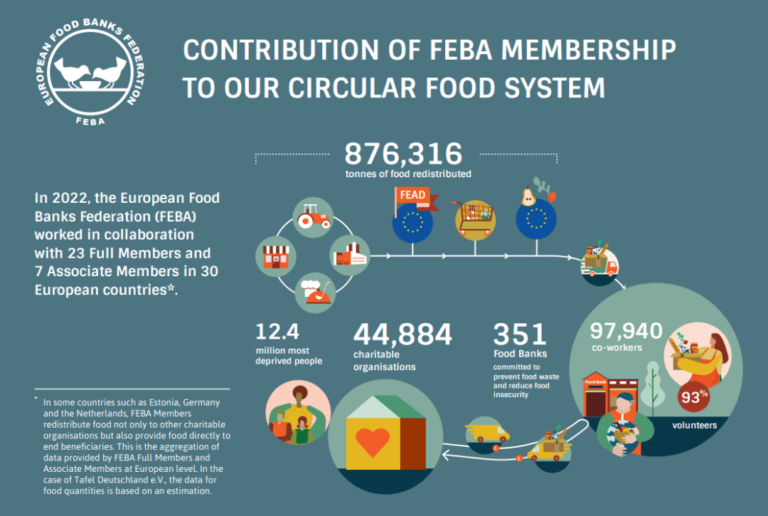How Geopost and FEBA Use Surplus Food to Respond to Charity Sourcing Needs
13 May 2025
Today's food waste paradox is striking: While 59 million tonnes of food are wasted annually in the EU, 7.3% of EU citizens struggle to afford a quality meal, with a significant portion of the population facing hunger and food insecurity.
With the release of our latest Sustainability Report just around the corner, we sat down with Suzanne Zudiker, Head of Fundraising & Strategic Partnerships at the European Food Banks Federation (FEBA), and Caryn-Ann Allen, Geopost’s Associate Director of Sustainability, to see how the organisation, with the support of partners like Geopost, is working to bridge the gap between food waste prevention and the provision of food resources to local communities in need.

In this challenging landscape of food insecurity, can you explain how FEBA builds capacity and develops skills within its member network?
Suzanne Zudiker: Every day, unimaginable amounts of food are wasted— resources that, if repurposed, could meet the needs of the millions experiencing food insecurity. It’s an unfortunate irony. In 2024, 77.3% of EU citizens struggled to afford a meal, a statistic that is simply unacceptable.
FEBA, the European Food Banks Federation, operates across 30 countries, supporting national food banks through knowledge-sharing, advocacy, food delivery logistics and collaboration with the European Commission and food waste working groups. At its core, FEBA’s mission is about both people and the planet. By rescuing food and redistributing it to those in need, we not only prevent food waste but also reduce food insecurity—pursuing two of the UN’s Sustainable Development Goals (SDGs) simultaneously.
Caryn-Ann Allen: FEBA’s commitment to people and planet resonates strongly with our own values at Geopost.
Is this alignment of values what drew Geopost and FEBA together in the first place?
C.A.: Absolutely. Our partnership began three years ago in a really organic, bottom-up way. Several Geopost Business Units were already working with local food banks, many of which were part of FEBA’s network. As a result, partnering with FEBA on a centralised level was a logical step to build on the financial support, employee volunteering programmes and food delivery logistics work already underway. It’s also a great way to give back to the communities where we operate.
We quickly realised that our shared focus on sustainability, preventing waste, including food waste, and supporting communities in need made FEBA the perfect partner. Over the years, I’d like to think our support has helped to make a dent in the immense challenge of food insecurity in Europe. It was a natural fit geographically and mission-wise, while also aligning perfectly with our values, in particular that of empowerment.
Partnering with FEBA on a group level was a logical step to build on the financial and logistical support we were already doing. - Caryn-Ann Allen, Geopost’s Associate Director of Sustainability
Concretely, how do FEBA members prevent food waste and reduce food insecurity?
S.Z.: FEBA members redistribute surplus food that would otherwise go to waste. This includes food from agricultural or industrial processes that slips through the cracks, items from grocery stores past their “sell by” date but still safe to consume, leftover food from hotel buffets, or products with minor packaging errors like misprints. In short, perfectly good food is channelled to those who need it most. By working with food producers, retailers, and manufacturers, FEBA and its network of food banks ensure that this edible food reaches communities facing food insecurity via effective food delivery logistics practices.
How does FEBA collaborate with local and international communities?
S.Z.: FEBA acts as a federation of food banks organised at the national level. We provide support to our members and facilitate the enormous task of collecting and redistributing hundreds of thousands of tonnes of food.
At EU level, we work to build relationships that enable collaboration, while our national members create partnerships with food producers, retailers, and local organisations to improve food delivery logistics. Together, we ensure that surplus food is rescued and distributed efficiently to those in need across Europe.
And while many of our members are incredibly savvy in logistics, after years of experience, our partnership with Geopost aims to further enhance industry knowledge and share best practices in food delivery logistics. This support can strengthen our network's ability to tackle logistical hurdles effectively and efficiently.
C.A.: I couldn’t agree more. We would like our approach to continue to go beyond financial donations—we’re also looking at ways to leverage our expertise to support food banks. While there’s already extensive knowledge within the food bank network, we want to explore how we can contribute, such as sharing insights from our own experience in switching to electric fleets.
How has FEBA evolved over the past decade?
S.Z.: FEBA and our member food banks across Europe have significantly expanded our geographic reach. This growth has allowed us to reduce food insecurity more comprehensively, reaching underserved and rural areas in addition to major cities. Together, in 2023, we reached 12.8 million people across Europe supported by a dynamic network of 352 Food Banks.

Alongside this expansion, our food banks have formed more strategic alliances with supermarkets, producers, and large-scale food distributors, streamlining the collection of surplus food and enhancing operational capacity.
In terms of efficiency and impact, the integration of advanced logistics and partnerships with food retailers has really improved operational efficiency. Food banks leverage best practices in inventory management, food safety, and distribution networks to ensure food is delivered quickly, safely, and with minimal waste.
How have corporate partnerships, like the one between Geopost and FEBA, contributed to reducing food insecurity?
C.A.: It’s always heart-warming to witness the dedication of Geopost employees across Europe. For instance, in France our food delivery business Chronofresh continues to work with one of their food customers to sort and donate undelivered food parcels to the nearest food bank, and our HQ teams have completed a week-long step challenge to raise funds for the French Food Bank Federation.
This past year, FEBA attributed Geopost funding to the food banks where support was most needed, meaning that Geopost contributed to the financing of warehouse repairs in Greece, while in Slovenia and Slovakia, we’re supporting the salaries of staff members focused on partnership development to strengthen local food bank operations.
What specific challenges do food banks face during the holiday season, and how do you overcome them?
S.Z.: The holiday season brings a sharp rise in demand for food assistance, driven by seasonal pressures like higher heating costs and the desire of families—regardless of income—to have a special holiday meal.
Fortunately, this is also the time when donors tend to be most generous. Food and financial contributions surge during the holidays, as people feel a deep connection to the idea of providing a warm, festive meal for others. This seasonal generosity better enables food banks to meet the increased demand.
Food banks leverage best practices in inventory management, food safety, and distribution networks to ensure food is delivered quickly, safely and with minimal waste. - Suzanne Zudiker, Head of Fundraising & Strategic Partnerships at the European Food Banks Federation (FEBA)
How has the Geopost-FEBA partnership evolved over the past three years, and what have been its most significant impacts?
C.A.: We actually formalised our partnership with FEBA just a few months before the war in Ukraine began. Almost immediately, there was an urgent need to assist refugees arriving in countries like Poland and Romania and we gladly supported FEBA’s Together4Ukraine initiative with a €200,000 euro donation. This crisis demonstrated the strength of the food bank network in being able to respond quickly when it truly mattered.
One of the key elements of our partnership is its flexibility. If one of our business units expresses interest, FEBA helps them connect with local food banks, creating opportunities for involvement and impact at the grassroots level.
S.Z.: Absolutely. What began as Geopost’s initiative to establish a single EU-level charity partnership quickly evolved into a strategic collaboration designed to address the areas of greatest need. By working at the European level, we can identify the most pressing challenges among our members and allocate resources effectively.
One of the key elements of our partnership is its flexibility. If one of our business units expresses interest, FEBA helps them connect with local food banks... - Caryn-Ann Allen, Geopost’s Associate Director of Sustainability
The partnership’s success stems from open collaboration and a shared willingness to prioritise impact over accolades. By funding critical but less visible projects—such as warehouse repairs or operational costs—we’ve made a tangible difference for food banks across Europe. This strategic approach, combining corporate resources with local expertise, is maximising the value of our partnership and helping to amplify its impact.
What’s next for FEBA and Geopost?
S.Z.: Our plan is to build on the work we’ve been doing, focusing each year on identifying impactful projects. These could either address the pressing needs of specific members or benefit the broader network, ensuring meaningful outcomes for as many food banks as possible.
C.A.: For me, a key focus is on strengthening employee engagement. It’s about mobilising more of our business units, even those that haven’t traditionally worked with local food banks, and building on existing employee engagement. In the year ahead, I’d love to see more employees actively supporting FEBA and local food banks, helping to better address the needs within the network. Ultimately, it’s about reinforcing the partnership and impact that underpin our work.
S.Z.: Exactly. There’s a lot of potential to expand knowledge-sharing initiatives, especially around solving logistical challenges. This could include hosting webinars, organising meetings between local business units and food bank logistics teams, or creating more opportunities for knowledge transfer.
Unfortunately, the need for food aid hasn’t diminished; it’s actually grown. That makes it even more critical for us to work collaboratively and find innovative ways to tackle these issues.
.. we want to explore how we can contribute, such as sharing insights from our own experience in switching to electric fleets.- Caryn-Ann Allen, Geopost’s Associate Director of Sustainability
On the FEBA side, what can other companies do to get involved?
S.Z.: Companies can contribute in several ways. Food manufacturers or businesses involved in the supply chain can donate surplus food. Financial support is also crucial, whether for specific projects or operational resources, which are always in high demand for charities. Food delivery logistics and supply chain partnerships are another powerful way to help. And of course, raising awareness is equally important. Partnerships, like ours with Geopost, play a big role in that. Providing companies with clear resources, contacts, and planning timelines can help centralise and streamline these efforts, making it easier for businesses to get involved meaningfully and efficiently.
C.A.: I would also like to invite all of our team members to get involved! That can include volunteering at your local food bank, raising awareness around food waste and food insecurity, and working together to create initiatives or fundraise locally. Every effort can make a difference!
